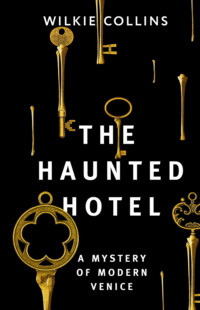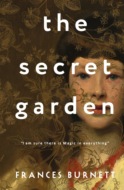Kitabı oku: «The Haunted Hotel: A Mystery of Modern Venice / Отель с привидениями: Тайна Венеции», sayfa 2
Chapter III
There was a time when a man in search of the pleasures of gossip sought the society of ladies. The man knows better now. He goes to the smoking-room of his club.
Doctor Wybrow lit his cigar, and looked round him at his brethren in social conclave assembled. The room was well filled; but the flow of talk was still languid. The Doctor innocently applied the stimulant that was wanted. When he inquired if anybody knew the Countess Narona, he was answered by something like a shout of astonishment. Never (the conclave agreed) had such an absurd question been asked before! Every human creature, with the slightest claim to a place in society, knew the Countess Narona. An adventuress with a European reputation of the blackest possible colour-such was the general description of the woman with the deathlike complexion and the glittering eyes.
Descending to particulars, each member of the club contributed his own little stock of scandal to the memoirs of the Countess. It was doubtful whether she was really, what she called herself, a Dalmatian lady. It was doubtful whether she had ever been married to the Count whose widow she assumed to be. It was doubtful whether the man who accompanied her in her travels (under the name of Baron Rivar, and in the character of her brother) was her brother at all. Report pointed to the Baron as a gambler at every ‘table’ on the Continent. Report whispered that his so-called sister had narrowly escaped being implicated in a famous trial for poisoning at Vienna-that she had been known at Milan as a spy in the interests of Austria-that her ‘apartment’ in Paris had been denounced to the police as nothing less than a private gambling-house-and that her present appearance in England was the natural result of the discovery. Only one member of the assembly in the smoking-room took the part of this much-abused woman, and declared that her character had been most cruelly and most unjustly assailed. But as the man was a lawyer, his interference went for nothing: it was naturally attributed to the spirit of contradiction inherent in his profession. He was asked derisively what he thought of the circumstances under which the Countess had become engaged to be married; and he made the characteristic answer, that he thought the circumstances highly creditable to both parties, and that he looked on the lady’s future husband as a most enviable man.
Hearing this, the Doctor raised another shout of astonishment by inquiring the name of the gentleman whom the Countess was about to marry.
His friends in the smoking-room decided unanimously that the celebrated physician must be a second ‘Rip-van-Winkle,’ and that he had just awakened from a supernatural sleep of twenty years. It was all very well to say that he was devoted to his profession, and that he had neither time nor inclination to pick up fragments of gossip at dinner-parties and balls. A man who did not know that the Countess Narona had borrowed money at Homburg of no less a person than Lord Montbarry, and had then deluded him into making her a proposal of marriage, was a man who had probably never heard of Lord Montbarry himself. The younger members of the club, humouring the joke, sent a waiter for the ‘Peerage’; and read aloud the memoir of the nobleman in question, for the Doctor’s benefit-with illustrative morsels of information interpolated by themselves.
‘Herbert John Westwick. First Baron Montbarry, of Montbarry, King’s County, Ireland. Created a Peer for distinguished military services in India. Born, 1812. Forty-eight years old, Doctor, at the present time. Not married. Will be married next week, Doctor, to the delightful creature we have been talking about. Heir presumptive, his lordship’s next brother, Stephen Robert, married to Ella, youngest daughter of the Reverend Silas Marden, Rector of Runnigate, and has issue, three daughters. Younger brothers of his lordship, Francis and Henry, unmarried. Sisters of his lordship, Lady Barville, married to Sir Theodore Barville, Bart.; and Anne, widow of the late Peter Norbury, Esq., of Norbury Cross. Bear his lordship’s relations well in mind, Doctor. Three brothers Westwick, Stephen, Francis, and Henry; and two sisters, Lady Barville and Mrs. Norbury. Not one of the five will be present at the marriage; and not one of the five will leave a stone unturned to stop it, if the Countess will only give them a chance. Add to these hostile members of the family another offended relative not mentioned in the ‘Peerage,’ a young lady-’
A sudden outburst of protest in more than one part of the room stopped the coming disclosure, and released the Doctor from further persecution.
‘Don’t mention the poor girl’s name; it’s too bad to make a joke of that part of the business; she has behaved nobly under shameful provocation; there is but one excuse for Montbarry-he is either a madman or a fool.’ In these terms the protest expressed itself on all sides. Speaking confidentially to his next neighbour, the Doctor discovered that the lady referred to was already known to him (through the Countess’s confession) as the lady deserted by Lord Montbarry. Her name was Agnes Lockwood. She was described as being the superior of the Countess in personal attraction, and as being also by some years the younger woman of the two. Making all allowance for the follies that men committed every day in their relations with women, Montbarry’s delusion was still the most monstrous delusion on record. In this expression of opinion every man present agreed-the lawyer even included. Not one of them could call to mind the innumerable instances in which the sexual influence has proved irresistible in the persons of women without even the pretension to beauty. The very members of the club whom the Countess (in spite of her personal disadvantages) could have most easily fascinated, if she had thought it worth her while, were the members who wondered most loudly at Montbarry’s choice of a wife.
While the topic of the Countess’s marriage was still the one topic of conversation, a member of the club entered the smoking-room whose appearance instantly produced a dead silence. Doctor Wybrow’s next neighbour whispered to him, ‘Montbarry’s brother-Henry Westwick!’
The new-comer looked round him slowly, with a bitter smile.
‘You are all talking of my brother,’ he said. ‘Don’t mind me. Not one of you can despise him more heartily than I do. Go on, gentlemen-go on!’
But one man present took the speaker at his word. That man was the lawyer who had already undertaken the defence of the Countess.
‘I stand alone in my opinion,’ he said, ‘and I am not ashamed of repeating it in anybody’s hearing. I consider the Countess Narona to be a cruelly-treated woman. Why shouldn’t she be Lord Montbarry’s wife? Who can say she has a mercenary motive in marrying him?’
Montbarry’s brother turned sharply on the speaker. ‘I say it!’ he answered.
The reply might have shaken some men. The lawyer stood on his ground as firmly as ever.
‘I believe I am right,’ he rejoined, ‘in stating that his lordship’s income is not more than sufficient to support his station in life; also that it is an income derived almost entirely from landed property in Ireland, every acre of which is entailed.’
Montbarry’s brother made a sign, admitting that he had no objection to offer so far.
‘If his lordship dies first,’ the lawyer proceeded, ‘I have been informed that the only provision he can make for his widow consists in a rent-charge on the property of no more than four hundred a year. His retiring pension and allowances, it is well known, die with him. Four hundred a year is therefore all that he can leave to the Countess, if he leaves her a widow.’
‘Four hundred a year is not all,’ was the reply to this. ‘My brother has insured his life for ten thousand pounds; and he has settled the whole of it on the Countess, in the event of his death.’
This announcement produced a strong sensation. Men looked at each other, and repeated the three startling words, ‘Ten thousand pounds!’ Driven fairly to the wall, the lawyer made a last effort to defend his position.
‘May I ask who made that settlement a condition of the marriage?’ he said. ‘Surely it was not the Countess herself?’
Henry Westwick answered, ‘It was the Countess’s brother’; and added, ‘which comes to the same thing.’
After that, there was no more to be said-so long, at least, as Montbarry’s brother was present. The talk flowed into other channels; and the Doctor went home.
But his morbid curiosity about the Countess was not set at rest yet. In his leisure moments he found himself wondering whether Lord Montbarry’s family would succeed in stopping the marriage after all. And more than this, he was conscious of a growing desire to see the infatuated man himself. Every day during the brief interval before the wedding, he looked in at the club, on the chance of hearing some news. Nothing had happened, so far as the club knew. The Countess’s position was secure; Montbarry’s resolution to be her husband was unshaken. They were both Roman Catholics, and they were to be married at the – el in Spanish Place. So much the Doctor discovered about them-and no more.
On the day of the wedding, after a feeble struggle with himself, he actually sacrificed his patients and their guineas, and slipped away secretly to see the marriage. To the end of his life, he was angry with anybody who reminded him of what he had done on that day!
The wedding was strictly private.
A close carriage stood at the church door; a few people, mostly of the lower class, and mostly old women, were scattered about the interior of the building. Here and there Doctor Wybrow detected the faces of some of his brethren of the club, attracted by curiosity, like himself. Four persons only stood before the altar-the bride and bridegroom and their two witnesses. One of these last was an elderly woman, who might have been the Countess’s companion or maid; the other was undoubtedly her brother, Baron Rivar. The bridal party (the bride herself included) wore their ordinary morning costume. Lord Montbarry, personally viewed, was a middle-aged military man of the ordinary type: nothing in the least remarkable distinguished him either in face or figure. Baron Rivar, again, in his way was another conventional representative of another well-known type. One sees his finely-pointed moustache, his bold eyes, his crisply-curling hair, and his dashing carriage of the head, repeated hundreds of times over on the Boulevards of Paris. The only noteworthy point about him was of the negative sort-he was not in the least like his sister. Even the officiating priest was only a harmless, humble-looking old man, who went through his duties resignedly, and felt visible rheumatic difficulties every time he bent his knees. The one remarkable person, the Countess herself, only raised her veil at the beginning of the ceremony, and presented nothing in her plain dress that was worth a second look. Never, on the face of it, was there a less interesting and less romantic marriage than this. From time to time the Doctor glanced round at the door or up at the galleries, vaguely anticipating the appearance of some protesting stranger, in possession of some terrible secret, commissioned to forbid the progress of the service. Nothing in the shape of an event occurred-nothing extraordinary, nothing dramatic. Bound fast together as man and wife, the two disappeared, followed by their witnesses, to sign the registers; and still Doctor Wybrow waited, and still he cherished the obstinate hope that something worth seeing must certainly happen yet.
The interval passed, and the married couple, returning to the church, walked together down the nave to the door. Doctor Wybrow drew back as they approached. To his confusion and surprise, the Countess discovered him. He heard her say to her husband, ‘One moment; I see a friend.’ Lord Montbarry bowed and waited. She stepped up to the Doctor, took his hand, and wrung it hard. He felt her overpowering black eyes looking at him through her veil. ‘One step more, you see, on the way to the end!’ She whispered those strange words, and returned to her husband. Before the Doctor could recover himself and follow her, Lord and Lady Montbarry had stepped into their carriage, and had driven away.
Outside the church door stood the three or four members of the club who, like Doctor Wybrow, had watched the ceremony out of curiosity. Near them was the bride’s brother, waiting alone. He was evidently bent on seeing the man whom his sister had spoken to, in broad daylight. His bold eyes rested on the Doctor’s face, with a momentary flash of suspicion in them. The cloud suddenly cleared away; the Baron smiled with charming courtesy, lifted his hat to his sister’s friend, and walked off.
The members constituted themselves into a club conclave on the church steps. They began with the Baron. ‘Damned ill-looking rascal!’ They went on with Montbarry. ‘Is he going to take that horrid woman with him to Ireland?’ ‘Not he! he can’t face the tenantry; they know about Agnes Lockwood.’ ‘Well, but where is he going?’ ‘To Scotland.’ ‘Does she like that?’ ‘It’s only for a fortnight; they come back to London, and go abroad.’ ‘And they will never return to England, eh?’ ‘Who can tell? Did you see how she looked at Montbarry, when she had to lift her veil at the beginning of the service? In his place, I should have bolted. Did you see her, Doctor?’ By this time, Doctor Wybrow had remembered his patients, and had heard enough of the club gossip. He followed the example of Baron Rivar, and walked off.
‘One step more, you see, on the way to the end,’ he repeated to himself, on his way home. ‘What end?’
Chapter IV
On the day of the marriage Agnes Lockwood sat alone in the little drawing-room of her London lodgings, burning the letters which had been written to her by Montbarry in the bygone time.
The Countess’s maliciously smart description of her, addressed to Doctor Wybrow, had not even hinted at the charm that most distinguished Agnes-the artless expression of goodness and purity which instantly attracted everyone who approached her. She looked by many years younger than she really was. With her fair complexion and her shy manner, it seemed only natural to speak of her as ‘a girl,’ although she was now really advancing towards thirty years of age. She lived alone with an old nurse devoted to her, on a modest little income which was just enough to support the two. There were none of the ordinary signs of grief in her face, as she slowly tore the letters of her false lover in two, and threw the pieces into the small fire which had been lit to consume them. Unhappily for herself, she was one of those women who feel too deeply to find relief in tears. Pale and quiet, with cold trembling fingers, she destroyed the letters one by one without daring to read them again. She had torn the last of the series, and was still shrinking from throwing it after the rest into the swiftly destroying flame, when the old nurse came in, and asked if she would see ‘Master Henry,’-meaning that youngest member of the Westwick family, who had publicly declared his contempt for his brother in the smoking-room of the club.
Agnes hesitated. A faint tinge of colour stole over her face.
There had been a long past time when Henry Westwick had owned that he loved her. She had made her confession to him, acknowledging that her heart was given to his eldest brother. He had submitted to his disappointment; and they had met thenceforth as cousins and friends. Never before had she associated the idea of him with embarrassing recollections. But now, on the very day when his brother’s marriage to another woman had consummated his brother’s treason towards her, there was something vaguely repellent in the prospect of seeing him. The old nurse (who remembered them both in their cradles) observed her hesitation; and sympathising of course with the man, put in a timely word for Henry. ‘He says, he’s going away, my dear; and he only wants to shake hands, and say good-bye.’ This plain statement of the case had its effect. Agnes decided on receiving her cousin.
He entered the room so rapidly that he surprised her in the act of throwing the fragments of Montbarry’s last letter into the fire. She hurriedly spoke first.
‘You are leaving London very suddenly, Henry. Is it business? or pleasure?’
Instead of answering her, he pointed to the flaming letter, and to some black ashes of burnt paper lying lightly in the lower part of the fireplace.
‘Are you burning letters?’
‘Yes.’
‘His letters?’
‘Yes.’
He took her hand gently. ‘I had no idea I was intruding on you, at a time when you must wish to be alone. Forgive me, Agnes-I shall see you when I return.’
She signed to him, with a faint smile, to take a chair.
‘We have known one another since we were children,’ she said. ‘Why should I feel a foolish pride about myself in your presence? why should I have any secrets from you? I sent back all your brother’s gifts to me some time ago. I have been advised to do more, to keep nothing that can remind me of him-in short, to burn his letters. I have taken the advice; but I own I shrank a little from destroying the last of the letters. No-not because it was the last, but because it had this in it.’ She opened her hand, and showed him a lock of Montbarry’s hair, tied with a morsel of golden cord. ‘Well! well! let it go with the rest.’
She dropped it into the flame. For a while, she stood with her back to Henry, leaning on the mantel-piece, and looking into the fire. He took the chair to which she had pointed, with a strange contradiction of expression in his face: the tears were in his eyes, while the brows above were knit close in an angry frown. He muttered to himself, ‘Damn him!’
She rallied her courage, and looked at him again when she spoke. ‘Well, Henry, and why are you going away?’
‘I am out of spirits, Agnes, and I want a change.’
She paused before she spoke again. His face told her plainly that he was thinking of her when he made that reply. She was grateful to him, but her mind was not with him: her mind was still with the man who had deserted her. She turned round again to the fire.
‘Is it true,’ she asked, after a long silence, ‘that they have been married to-day?’
He answered ungraciously in the one necessary word:-’Yes.’
‘Did you go to the church?’
He resented the question with an expression of indignant surprise. ‘Go to the church?’ he repeated. ‘I would as soon go to-’ He checked himself there. ‘How can you ask?’ he added in lower tones. ‘I have never spoken to Montbarry, I have not even seen him, since he treated you like the scoundrel and the fool that he is.’
She looked at him suddenly, without saying a word. He understood her, and begged her pardon. But he was still angry. ‘The reckoning comes to some men,’ he said, ‘even in this world. He will live to rue the day when he married that woman!’
Agnes took a chair by his side, and looked at him with a gentle surprise.
‘Is it quite reasonable to be so angry with her, because your brother preferred her to me?’ she asked.
Henry turned on her sharply. ‘Do you defend the Countess, of all the people in the world?’
‘Why not?’ Agnes answered. ‘I know nothing against her. On the only occasion when we met, she appeared to be a singularly timid, nervous person, looking dreadfully ill; and being indeed so ill that she fainted under the heat of my room. Why should we not do her justice? We know that she was innocent of any intention to wrong me; we know that she was not aware of my engagement-’
Henry lifted his hand impatiently, and stopped her. ‘There is such a thing as being too just and too forgiving!’ he interposed. ‘I can’t bear to hear you talk in that patient way, after the scandalously cruel manner in which you have been treated. Try to forget them both, Agnes. I wish to God I could help you to do it!’
Agnes laid her hand on his arm. ‘You are very good to me, Henry; but you don’t quite understand me. I was thinking of myself and my trouble in quite a different way, when you came in. I was wondering whether anything which has so entirely filled my heart, and so absorbed all that is best and truest in me, as my feeling for your brother, can really pass away as if it had never existed. I have destroyed the last visible things that remind me of him. In this world I shall see him no more. But is the tie that once bound us, completely broken? Am I as entirely parted from the good and evil fortune of his life as if we had never met and never loved? What do you think, Henry? I can hardly believe it.’
‘If you could bring the retribution on him that he has deserved,’ Henry Westwick answered sternly, ‘I might be inclined to agree with you.’
As that reply passed his lips, the old nurse appeared again at the door, announcing another visitor.
‘I’m sorry to disturb you, my dear. But here is little Mrs. Ferrari wanting to know when she may say a few words to you.’
Agnes turned to Henry, before she replied. ‘You remember Emily Bidwell, my favourite pupil years ago at the village school, and afterwards my maid? She left me, to marry an Italian courier, named Ferrari-and I am afraid it has not turned out very well. Do you mind my having her in here for a minute or two?’
Henry rose to take his leave. ‘I should be glad to see Emily again at any other time,’ he said. ‘But it is best that I should go now. My mind is disturbed, Agnes; I might say things to you, if I stayed here any longer, which-which are better not said now. I shall cross the Channel by the mail to-night, and see how a few weeks’ change will help me.’ He took her hand. ‘Is there anything in the world that I can do for you?’ he asked very earnestly. She thanked him, and tried to release her hand. He held it with a tremulous lingering grasp. ‘God bless you, Agnes!’ he said in faltering tones, with his eyes on the ground. Her face flushed again, and the next instant turned paler than ever; she knew his heart as well as he knew it himself-she was too distressed to speak. He lifted her hand to his lips, kissed it fervently, and, without looking at her again, left the room. The nurse hobbled after him to the head of the stairs: she had not forgotten the time when the younger brother had been the unsuccessful rival of the elder for the hand of Agnes. ‘Don’t be down-hearted, Master Henry,’ whispered the old woman, with the unscrupulous common sense of persons in the lower rank of life. ‘Try her again, when you come back!’
Left alone for a few moments, Agnes took a turn in the room, trying to compose herself. She paused before a little water-colour drawing on the wall, which had belonged to her mother: it was her own portrait when she was a child. ‘How much happier we should be,’ she thought to herself sadly, ‘if we never grew up!’
The courier’s wife was shown in-a little meek melancholy woman, with white eyelashes, and watery eyes, who curtseyed deferentially and was troubled with a small chronic cough. Agnes shook hands with her kindly. ‘Well, Emily, what can I do for you?’
The courier’s wife made rather a strange answer: ‘I’m afraid to tell you, Miss.’
‘Is it such a very difficult favour to grant? Sit down, and let me hear how you are going on. Perhaps the petition will slip out while we are talking. How does your husband behave to you?’
Emily’s light grey eyes looked more watery than ever. She shook her head and sighed resignedly. ‘I have no positive complaint to make against him, Miss. But I’m afraid he doesn’t care about me; and he seems to take no interest in his home-I may almost say he’s tired of his home. It might be better for both of us, Miss, if he went travelling for a while-not to mention the money, which is beginning to be wanted sadly.’ She put her handkerchief to her eyes, and sighed again more resignedly than ever.
‘I don’t quite understand,’ said Agnes. ‘I thought your husband had an engagement to take some ladies to Switzerland and Italy?’
‘That was his ill-luck, Miss. One of the ladies fell ill-and the others wouldn’t go without her. They paid him a month’s salary as compensation. But they had engaged him for the autumn and winter-and the loss is serious.’
‘I am sorry to hear it, Emily. Let us hope he will soon have another chance.’
‘It’s not his turn, Miss, to be recommended when the next applications come to the couriers’ office. You see, there are so many of them out of employment just now. If he could be privately recommended-’ She stopped, and left the unfinished sentence to speak for itself.
Agnes understood her directly. ‘You want my recommendation,’ she rejoined. ‘Why couldn’t you say so at once?’
Emily blushed. ‘It would be such a chance for my husband,’ she answered confusedly. ‘A letter, inquiring for a good courier (a six months’ engagement, Miss!) came to the office this morning. It’s another man’s turn to be chosen-and the secretary will recommend him. If my husband could only send his testimonials by the same post-with just a word in your name, Miss-it might turn the scale, as they say. A private recommendation between gentlefolks goes so far.’ She stopped again, and sighed again, and looked down at the carpet, as if she had some private reason for feeling a little ashamed of herself.
Agnes began to be rather weary of the persistent tone of mystery in which her visitor spoke. ‘If you want my interest with any friend of mine,’ she said, ‘why can’t you tell me the name?’
The courier’s wife began to cry. ‘I’m ashamed to tell you, Miss.’
For the first time, Agnes spoke sharply. ‘Nonsense, Emily! Tell me the name directly-or drop the subject-whichever you like best.’
Emily made a last desperate effort. She wrung her handkerchief hard in her lap, and let off the name as if she had been letting off a loaded gun:-’Lord Montbarry!’
Agnes rose and looked at her.
‘You have disappointed me,’ she said very quietly, but with a look which the courier’s wife had never seen in her face before. ‘Knowing what you know, you ought to be aware that it is impossible for me to communicate with Lord Montbarry. I always supposed you had some delicacy of feeling. I am sorry to find that I have been mistaken.’
Weak as she was, Emily had spirit enough to feel the reproof. She walked in her meek noiseless way to the door.
‘I beg your pardon, Miss. I am not quite so bad as you think me. But I beg your pardon, all the same.’
She opened the door. Agnes called her back. There was something in the woman’s apology that appealed irresistibly to her just and generous nature. ‘Come,’ she said; ‘we must not part in this way. Let me not misunderstand you. What is it that you expected me to do?’
Emily was wise enough to answer this time without any reserve. ‘My husband will send his testimonials, Miss, to Lord Montbarry in Scotland. I only wanted you to let him say in his letter that his wife has been known to you since she was a child, and that you feel some little interest in his welfare on that account.
I don’t ask it now, Miss. You have made me understand that I was wrong.’
Had she really been wrong? Past remembrances, as well as present troubles, pleaded powerfully with Agnes for the courier’s wife. ‘It seems only a small favour to ask,’ she said, speaking under the impulse of kindness which was the strongest impulse in her nature. ‘But I am not sure that I ought to allow my name to be mentioned in your husband’s letter. Let me hear again exactly what he wishes to say.’ Emily repeated the words-and then offered one of those suggestions, which have a special value of their own to persons unaccustomed to the use of their pens. ‘Suppose you try, Miss, how it looks in writing?’ Childish as the idea was, Agnes tried the experiment. ‘If I let you mention me,’ she said, ‘we must at least decide what you are to say.’ She wrote the words in the briefest and plainest form:-’I venture to state that my wife has been known from her childhood to Miss Agnes Lockwood, who feels some little interest in my welfare on that account.’ Reduced to this one sentence, there was surely nothing in the reference to her name which implied that Agnes had permitted it, or that she was even aware of it. After a last struggle with herself, she handed the written paper to Emily. ‘Your husband must copy it exactly, without altering anything,’ she stipulated. ‘On that condition, I grant your request.’ Emily was not only thankful-she was really touched. Agnes hurried the little woman out of the room. ‘Don’t give me time to repent and take it back again,’ she said. Emily vanished.
‘Is the tie that once bound us completely broken? Am I as entirely parted from the good and evil fortune of his life as if we had never met and never loved?’ Agnes looked at the clock on the mantel-piece. Not ten minutes since, those serious questions had been on her lips. It almost shocked her to think of the common-place manner in which they had already met with their reply. The mail of that night would appeal once more to Montbarry’s remembrance of her-in the choice of a servant.
Two days later, the post brought a few grateful lines from Emily. Her husband had got the place. Ferrari was engaged, for six months certain, as Lord Montbarry’s courier.








